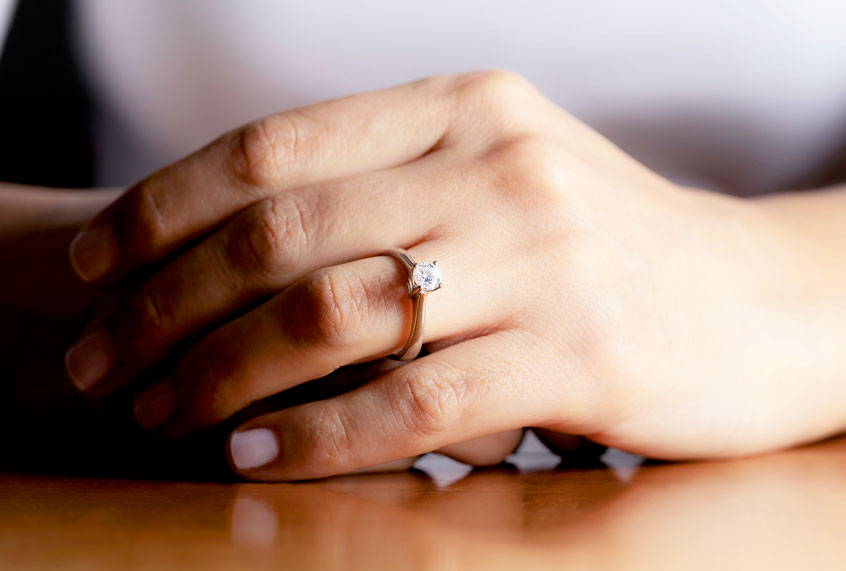The private Facebook group called “That’s it, I’m ring shaming” sets out a list of rules that members must abide by in order to join and participate. Rule 7 is “No Praising.” The description of the rule lets participants know that the group was created to shame all rings. “Even if you love them, get creative and shame, or just like the post and scroll past,” it reads. “Praising comments are not welcomed or wanted. Shame. The. Ring!”
The group achieved widespread notoriety in late 2018, when a post by a member hit Reddit. “Ewwww. Self-shame Friday here I come. Found this in the BF’s nightstand. Not a fan,” she wrote in her caption above a picture of an open box. Inside was a three-stone, silver ring.
“Please roast and then tell me how to tactfully say no you need to go get something different,” the post concluded.
Understandably, people from outside the group were pretty appalled. Commenters suggested the poster deserved to be shamed — not the ring.
“You could literally give me an onion ring and I would marry you, if I was truly in love with you. What’s wrong with some entitled people?” one Reddit user wrote. But the idea of the group obviously appealed to others; the membership count of “That’s it, I’m ring shaming” ballooned from 19,000 members at the time of the posting to a current 79,134 members.
The history of the diamond engagement ring
For what it’s worth, diamond engagement rings — a style that dominates that group — haven’t always been popular. They reached mainstream demand in the late ’40s, when De Beers launched its now-classic slogan, “A Diamond is Forever,” and a diamond’s purported permanence soon became synonymous with a lasting marriage.
“By the 1950s, you got kind of a cookie-cutter approach to marriages. Everybody was wearing white. Everybody’s supposed to have a diamond ring,” historian Stephanie Coontz said in a recent Washington Post piece. “[A woman’s] role was to be a wife, so the engagement ring was a sign of, ‘Okay, I’m moving into that role. This proves that I’m attractive to men. It proves that I can get a husband. It proves how much he loves me, depending on the size of the ring.'”
Put another way, as “The Office” boss Michael Scott says: “It’s like this tangible thing that you can point to and say, ‘Hey man, I love you this many dollars worth.”
But as relationships develop and change — same-sex marriages have less established customs, and the number of U.S. adults cohabiting with a partner continues to rise — the appeal of engagement rings has dulled for some.
The appeal of ring shaming
This move away from the perceived traditional marriage doesn’t seem to be the motivation behind the membership surge in the ring-shaming group though.
I was a member of the group for approximately 17 hours, before I was unceremoniously banned and blocked for asking the admins for an interview. I did find one woman who would speak to me about why she joined the group on the condition that I would only use her first name, Maggie.
“The group is really about self-deprecating humor, or just making fun of bad Facebook jewelry ads,” she said. “I’ve been in the group since just after that post went viral.”
In the wake of all the national attention, Maggie revealed that “That’s it, I’m ring shaming” went through a few changes; admins will ban anyone who mentions the infamous post, and the group briefly changed their name to the backwards-reading, “gnimahS gniR m’I, tI s’tahT.”
“Sometimes things can get a little too personal, but a lot of people ask for it,” said Maggie.
Which is true. When scrolling through, I saw where someone had posted her great-grandmother’s engagement ring, a family heirloom, which one commenter compared to a “genital wart” and a photo under which commenters mocked the ring’s microscopic gems. It’s a steady stream of style-based abuse; some people personally ask for it (as part of the group’s self-shame Friday), while others post pictures of friends’ and strangers’ outstretched hands.
While some of the jewelry on display is questionable — gaudy costume pieces abound — most of the pictures are of just totally normal rings.
Alternatives to ring shaming
Since being booted from the ring-shaming group, I’ve found other Facebook groups set up with an explicit mission to shame: nail shaming, cake shaming, houseplant shaming. I ask my boyfriend, who restores vintage motorcycles, if there are custom motorcycle shaming groups. He sighs, rubs his temples, and says, “One or two.” The people who are in them are jerks though, he cautions.
I found myself more viscerally horrified by some groups than others; ink shaming bothered me more than font-shaming, for example. I don’t know, mocking someone’s tattoo — something that is now intrinsically part of themselves — seems harsher than questioning someone’s decision to use Papyrus on a PTA flyer.
This led me to the question: what is fair game for internet shaming? Is our desire to participate in these groups another indication of how the relative anonymity our screens provide can foster a certain nastiness that wouldn’t show up in real life? Or is it simply an extension of the comedic standby, the roast? And above all — where do engagement rings fit into all of this?
According to Maggie, shaming groups aren’t really for everyone. Rule 6 of “That’s it, I’m ring shaming speaks to this: “This is a shaming group, if you can’t handle the heat don’t post your ring.” For those who opt out, maybe a spin-off group like “That’s It, I’m Ring Praising,” is more their speed.

